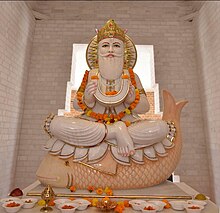| Bhagwan Jhulelal | |
|---|---|
 Jhulelal, incarnation of Varuna, sitting on a lotus flower in the middle of a river and surrounded by a couple of silver fish (palla fish) | |
| Affiliation | Varuna Deva |
| Abode | Sea & River Indus |
| Mantra | Om Vam Varunaya Namah |
| Weapon | Sword |
| Mount | Hilsa Fish & Horse |
| Genealogy | |
| Siblings | Soma Rai & Bheda Rai |
Jhulelal (Sindhi: جھوليلال; झूलेलाल) a folkloric deity among the sect of Sindhis, the most revered deity of Sindhi Hindus in the modern-day republics of Pakistan and India.[1][2][a]
Legends converge upon that Jhulelal was born during the rule of one Islamic despot "Mirkshah", who had issued an ultimatum to local Hindus for converting to Islam.[1][4] The reincarnation of a Sindhi deity, Jhulelal exhibited supernatural powers since childhood; he preached about how the Muslims believed in the same God, and emphasized that the Koran forbade forced conversion.[1][2] Ultimately, Jhulelal convinced the King to spare the Hindus and even gained devotees among the Muslims.[1][2]
Devotion towards Jhulelal was very uniform in pre-partition Sindh and he was one of the many deities belonging to the Sindhi cultural pantheon.[1][2] However, in 1950 Indian Sindhis, led by Ram Panjwani in Bombay, decided to transform Jhulelal into the icon of unity for all Sindhis and unify the sindhi community.[1][2] Devotional songs were penned, pamphlets printed, statues installed, festivals celebrated, and cultural events organized in thousands for the cause of Jhulelal.[1] Over the course of decades, Jhulelal has successfully become the representative Unifying God of Sindhis.[1]
Iconography of Jhulelal varies widely.[1][5] Sindhi Hindus worship Jhulelal at the Shrine at Odero Lal in Pakistan's Sindh province, which is jointly used by Sindhi Hindus, and Sindhi Muslims who revere the shrine as the tomb of Sheikh Tahir. A second shrine named Jhulelal Tirthdham exists in India at Narayan Sarovar, Kutch, Gujarat.[6]
- ^ a b c d e f g h i Cite error: The named reference
falzon159was invoked but never defined (see the help page). - ^ a b c d e Cite error: The named reference
Ramey2008p8was invoked but never defined (see the help page). - ^ Lari, Suhail Zaheer (1994). A history of Sindh. Oxford. ISBN 0195775015. Retrieved 19 December 2017.
- ^ Bhavnani, Nandita (2014). The Making of Exile: Sindhi Sindhis and the Partition of India. Westland. ISBN 9789384030339.
- ^ "Jhulay Lal's full circle". 20 December 2015.
- ^ Cite error: The named reference
Tirthdham1was invoked but never defined (see the help page).
Cite error: There are <ref group=lower-alpha> tags or {{efn}} templates on this page, but the references will not show without a {{reflist|group=lower-alpha}} template or {{notelist}} template (see the help page).